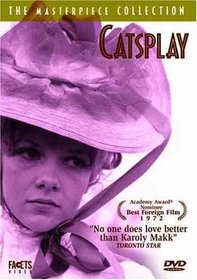| Actors: Margit Dajka, Ildikó Piros, Elma Bulla, Éva Dombrádi, Mari Töröcsik Director: Károly Makk Creators: János Tóth, Károly Makk, György Sívó, István Örkény Genres: Indie & Art House, Drama, Music Video & Concerts Sub-Genres: Indie & Art House, Love & Romance, Family Life, Music Video & Concerts Studio: Facets Format: DVD - Black and White,Full Screen - Subtitled DVD Release Date: 10/25/2005 Original Release Date: 01/01/1972 Theatrical Release Date: 01/01/1972 Release Year: 2005 Run Time: 1hr 38min Screens: Black and White,Full Screen Number of Discs: 1 SwapaDVD Credits: 1 Total Copies: 0 Members Wishing: 2 MPAA Rating: NR (Not Rated) Languages: Hungarian Subtitles: English See Also: |
Search - Catsplay on DVD
  | Catsplay Actors: Margit Dajka, Ildikó Piros, Elma Bulla, Éva Dombrádi, Mari Töröcsik Director: Károly Makk Genres: Indie & Art House, Drama, Music Video & Concerts NR 2005 1hr 38min An important figure in the new wave of Hungarian cinema, neglected Karoly Makk was acclaimed for telling stories of great emotional power with restraint and subtlety. CATSPLAY offers a taste of this forgotten master?s tale... more » |
Larger Image |
Movie DetailsSimilar Movies
|
Movie ReviewsCan Love Survive Dark, Lonely Days? A.Trendl HungarianBookstore.com | Glen Ellyn, IL USA | 11/11/2006 (5 out of 5 stars) ""Love" ("Szerelem" in Hungarian) is not a perfect movie, as much of its value remains in the 1970s, when Communist still reigned feebly in Hungary. There is an art house tone to some of the camera shots, making it less accessible to the popular moviegoing public. Despite this, "Love" evokes core human questions, and shows a resolution that is passionate in its subtlety. The conflict is quiet: can love survive during dark times? Can a daughter-in-law love her mother-in-law as she lay dying? Can the wife love her husband, stolen into prison by the government? If he is released, with she love him as she loved him before? Set in Budapest, largely within the mother's bedroom, the movie examines the challenge of committed love. Luca is a long-suffering daughter of her dying elderly mother-in-law, and wife of Janos, imprisoned for a minor political action in the severe Communist-era Hungary. Lili Darvas, who plays the bedridden mother, pulls off a difficult role with complete persuasion. Her mannerisms and nuances are convincing, and she maintains this throughout the movie. Her son Janos is in prison, but she is told by Luca otherwise. Mari Torocsik, as Luca, has a wry Valerie Bertinelli look with twice the intelligence. Her husband is in prison, but she concocts an elaborate story about his success as a film maker in New York. Her facts about the USA are not all correct, but her effort to help her mother-in-law believe is creative and strong. As the mother's days grow bleaker, Luca struggles to keep her spirits up. Her own loneliness aches on, and, if were not for the support of the mother's housekeeper, Iren, may have given in long ago. The anti-Communist subtext does not dominate the film. Rather, the repression of Communism is presented as a simple reality. Homes get taken away when the person dies or loses a spouse. People are fired because of the spouse's actions. There is no real opportunity to do more than survive. None of this is shouted loudly, but is organic to life in Hungary at this time. I fully recommend "Love." Anthony Trendl editor, HungarianBookstore.com" Much To Love About "Love" Alex Udvary | chicago, il United States | 12/26/2006 (4 out of 5 stars) "Recently I saw Miklos Jancso's "Electra My Love". It was a movie that dealt with Communism in Hungary but did it in an experimental way. He used Greek tragedy and music. As I watched that movie I kept thinking about Karoly Makk's film "Love (Szerelem)" which also shows life under communism but with a more traditional narrative. And it is also more poetic.
Lili Darvas plays an elderly bed-ridden woman who gets frequent visits from her daughter-in-law, Luca (Mari Torocsik, who was also in "Electra My Love"). The man in their life, Janos, Luca's husband and the old woman's son, is in prison for political activities he may or may not have been involved in. The mother doesn't know this is. Luca has been writing to her pretending to be her son. Supposedly the son is off in California where he is making a movie. Now you may ask how does this show Hungary's rule under communism? It does this through the Janos character, who may have been wrongly imprisoned. And through the Luca character who struggles to get by, since she is all by herself and must take care of her mother-in-law. But "Love" is about more than this. It is about age. Notice the film is mostly about the mother and daughter-in-law, who represent two different era's. It is about remembering the past and the hope that the future will be better. Karoly Makk may not be very well known to audience's outside of Hungary. Come to think of it, he may not even be remembered by Hungarians either. As far as I know he has only directed two film of lasting importance. This film and "Cat's Play". He is probably best known to film buff's with an interest in international cinema and to older Hungarians. It should also be of note to point out the film brought Makk international fame. The film was nominated for several awards at the Cannes film festival, including the Golden Palm and was named one of the best films of the year by the New York Times. Bottom-line: Sadly largely forgotten film that may be director Karoly Makk's best film. A sad, quite meditation on life under communism and the enduring spirit of the human condition." |





